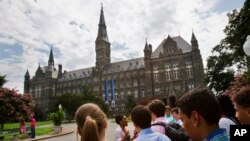Georgetown University, a prominent Jesuit school in Washington, D.C., has announced how it plans to atone for the historical role it played in America's institutionalized system of slavery, including the sale of 272 slaves of African descent.
University President John DeGioia presented a series of recommendations Thursday, including giving preferential status during the admissions process to descendants of the slaves who were sold in 1838 to help keep the university solvent. The proposal, similar to admissions advantages offered to family members of alumni, may be groundbreaking.
Craig Steven Wilder, a Massachusetts Institute of Technology historian and author of Ebony & Ivy: Race, Slavery and the Troubled History of America's Universities, is not aware of any other university with historical ties to slavery offering such preferential status. Wilder attributes this, in part, to Georgetown's being a Jesuit institution that is run like a corporate body, giving it the unique ability to keep very detailed historical records.
"The record-keeping of the Jesuits actually allows you to trace the names of the people who were enslaved and also the places to which they were sold, and you can kind of do a genealogy and a biography for many of the Jesuit slaves," Wilder told VOA.
Additional recommendations
The university also plans to issue a formal apology, create an institute devoted to the study of slavery, and build a memorial to the slaves who labored for the university, including those who were sold. Also, two buildings on campus will be renamed for an enslaved man and a Catholic African-American educator.
The recommendations came after DeGioia met earlier this year with descendants in Washington state and Louisiana, to which the slaves who were sold were transported from Jesuit farms in Maryland.
Wilder applauded Georgetown for engaging with the descendants in an attempt to address their pain and suffering.
"I think it will add to the necessary discussion that we still have to have as a society about the role that slavery played in the creation of the United States," he said.
But Wilder is concerned that many of the university's proposals, such as making admissions considerations, could take years, even decades to achieve, making it harder to keep the commitments.
"We're very good at advertising our benevolence. We're not as good at keeping our word," he said. "And so what I'd like to see is the ways in which Georgetown is going to institutionalize those commitments to make sure that they're kept over time, and to make sure that they're real."
Reparations
University of North Carolina School of Law professor Alfred Brophy, who has studied universities and slavery, said, "This is not just an issue of descendants of 272 people owned by the Jesuits and then sold south into further slavery. It's a question about how the issues of slavery are connected to the present. And what is very positive and important is that Georgetown is not limiting the discussion to those descendants, but is trying to do something that builds out and is more comprehensive."
The proposals unveiled by the university are just the beginning. In addition to engaging directly with the descendants of the enslaved people and with those associated with the university, Georgetown says it will prioritize issues such as reparations.
"While we acknowledge that the moral debt is slaveholding and the sale of the enslaved people can never be repaid, we are convinced that reparative justice requires a meaningful financial commitment from the university," Georgetown said.
Wilder agreed that Georgetown should explore the issue of reparations as it navigates what he described as an intellectual, political and moral crisis.
"This is actually a necessary consequence of any honest engagement with the history of slavery and, particularly, with an institution like Georgetown," he said.
Wilder said Georgetown's moral crisis was created by the fact that it's a Catholic institution confronting its history with slavery and, as a result, cannot escape the moral consequences of its past.




